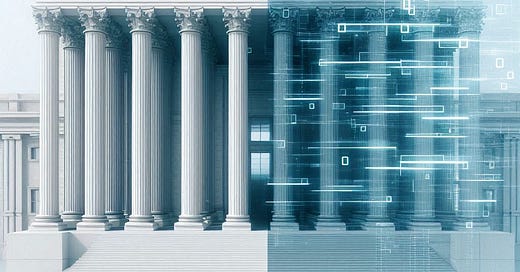Human & Machine: When System Change Becomes Inevitable
A short reflection on the USA, Musk, and DOGE
Recent events in the U.S. state apparatus, with Elon Musk and DOGE's interventions, raise a fundamental question for anyone working within societal systems: How do we handle situations where change is not just desirable but inevitable?
In our organizations, we encounter two opposing stances toward change. The first, represented by tech-driven reformers like Musk, views every established process as inefficient bureaucracy that must be dismantled. They argue for radical transformation, where AI and automation should replace what they see as outdated practices. The second position is the institutional reflex - a rigid adherence to existing structures, as if formalizations were sacred texts that must not be loosened or lost.
Between these extremes lies a more nuanced reality. Today's institutions carry valuable knowledge that has been formalized and built up through centuries of democratic dialogue and practical experience. At the same time, new technology and changing societal needs demand comprehensive renewal. It's not about revolution or stagnation, but about finding paths for development that preserve what's valuable while meeting new challenges.
The statistics from DOGE are thought-provoking - nearly 100 million words of federal regulations across more than 215,000 sections. When formalization reaches this scale, we must question whether the relationship between Human and Machine has become unmanageable. Yet each regulation represents an attempt to translate democratic decisions into implementable guidance, to ensure consistency and fairness in public service.
With AI's accelerating development and the ethical challenges it poses, it's clear we cannot continue as before. It would be naive to think that today's institutions, built for an analog era, can meet these challenges without significant change. But it would be equally naive to believe that change is best achieved through top-down decrees. When reforms are forced through without grounding in practice or respect for institutions' own competence, we risk losing both valuable knowledge and democratic legitimacy.
The way forward lies in creating structures for productive change, where systematic efficiency is balanced against democratic anchoring. It's about developing frameworks for how new technology can be integrated into existing institutions, how different forms of knowledge can meet in what I call the melting pot. For ultimately, our institutions are built through centuries of collective learning - it is through this same type of process, not through revolutionary decrees or resistance to change, that they can evolve for a new era.
A short reflection on Social Work






Although my offices have no issue with the Musk, Trump, Doge et. al., in light of welfare services, I would much prefer to "hit the street" to explain, for example in "very simple terms" the value of being alive in an under-represented community and environment. People's Capitalism should be taught universally (e.g. what is your current OTC [Over the Counter Value] and what must be done to ensure stability in underserved communities! Good post Johan! /s/